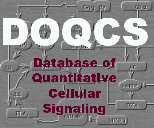| |
Reaction
Name | Pathway Name /
Pathway No. | Kf | Kb | Kd | tau | Reagents |
| 1 | CaM-bind-AC1 | AC
Pathway No. 251 | 49.9997
(uM^-1 s^-1) | 1
(s^-1) | Kd(bf) = 0.02(uM) | - | Substrate:
CaM-Ca4
AC1
Products:
AC1-CaM
|
| Half-max at 20 nM CaM (Tang et al JBC 266:13 8595-8603 1991 kb/kf = 20 nM = 12000 #/cell so kf = kb/12000 = kb * 8.333e-5 | | 2 | dephosph-AC2 | AC
Pathway No. 251 | 0.1
(s^-1) | 0
(s^-1) | - | - | Substrate:
AC2*
Products:
AC2
|
| Random rate. | | 3 | dephosph-PDE | AC
Pathway No. 251 | 0.01
(s^-1) | 0
(s^-1) | - | - | Substrate:
cAMP-PDE*
Products:
cAMP-PDE
|
| The rates for this are poorly constrained. In adipocytes (probably a different PDE) the dephosphorylation is complete within 15 min, but there are no intermediate time points so it could be much faster. Identity of phosphatase etc is still unknown. | | 4 | CaM_bind_PDE1 | AC
Pathway No. 251 | 719.982
(uM^-1 s^-1) | 5
(s^-1) | Kd(bf) = 0.0069(uM) | - | Substrate:
PDE1
CaM-Ca4
Products:
CaM.PDE1
|
| For olf epi PDE1, affinity is 7 nM. Assume same for brain. Reaction should be pretty fast. Assume kb = 5/sec. Then kf = 5 / (0.007 * 6e5) = 1.2e-3 | | 5 | cAMP_diffusion | AC
Pathway No. 251 | 300
(s^-1) | 5.4
(s^-1) | Not applicable** | - | Substrate:
cAMP
Products:
cAMP_in_dend
|
| Represents diffusion, from a volume of 9e-20 to 5e-18. Assuming neck dimensions of 0.1 x 0.1 microns, this works out to a diffusion const of about 270 um^2/sec, which is pretty conservative. It is what cAMP does in frog cilia. |
** This is a trasport reation between compartments of different volumes. Therefore Kd is not applicable. Please Note Kf, Kb units are in number of molecules instead of concentration